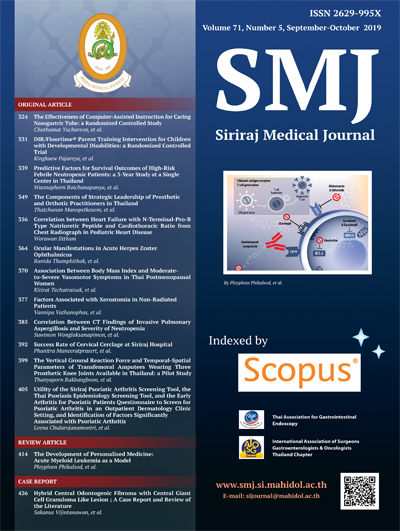Predictive Factors for Survival Outcomes of High-Risk Febrile Neutropenic Patients: a 3-Year Study at a Single Center in Thailand
DOI:
https://doi.org/10.33192/Smj.2019.52Keywords:
Febrile neutropenia; risk factors; mortality; Thailand; developing countryAbstract
Objective: This study aimed to identify the risk factors associated with mortality in febrile neutropenic patients.
Methods: This 3-year, single center, retrospective, observational study was conducted at Chiangrai Prachanukroh Hospital, Chiangrai Province, Thailand. The inclusion criteria consisted of a patient age of over 15 years and a diagnosis of febrile neutropenia.
Results: Most of the 303 febrile neutropenic inpatients had a Multinational Association for Supportive Care in Cancer (MASCC) risk score < 21. The median length of stay was 6 days (interquartile range: 4-11 days). During 30 days of admission, 24.8% of the patients succumbed. In a univariate analysis, patients receiving G-CSF, the post-chemotherapy-related group, patients with MASCC score > 16, and patients admitted in private had significantly higher survival rate. In a multivariate analysis, a MASCC score ≤ 16 and non-chemotherapy-related groups were associated with an increased mortality risk.
Conclusion: The 30-day survival rate of febrile neutropenic patients in Thailand is seventy-five percent. Low MASCC score and non-chemotherapy-related neutropenia are associated with a higher risk of unfavorable outcomes.
Downloads
Published
How to Cite
Issue
Section
License
Authors who publish with this journal agree to the following conditions:
Copyright Transfer
In submitting a manuscript, the authors acknowledge that the work will become the copyrighted property of Siriraj Medical Journal upon publication.
License
Articles are licensed under a Creative Commons Attribution-NonCommercial-NoDerivatives 4.0 International License (CC BY-NC-ND 4.0). This license allows for the sharing of the work for non-commercial purposes with proper attribution to the authors and the journal. However, it does not permit modifications or the creation of derivative works.
Sharing and Access
Authors are encouraged to share their article on their personal or institutional websites and through other non-commercial platforms. Doing so can increase readership and citations.















